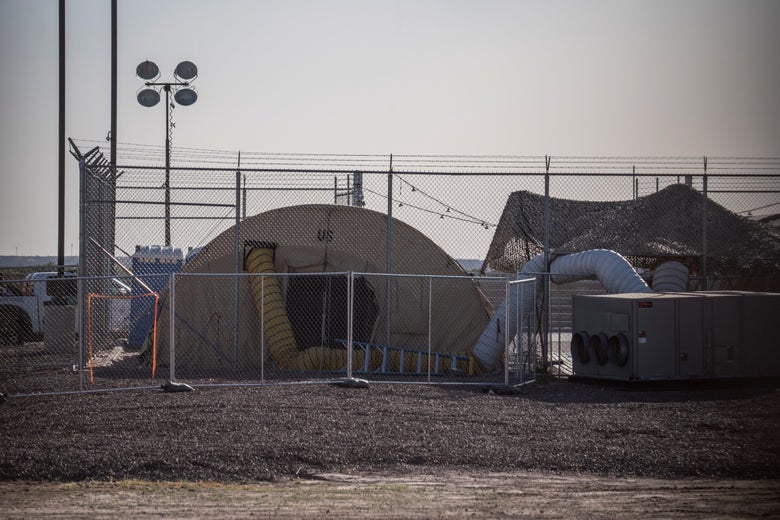
A temporary facility set up to hold migrants is pictured at a United States Border Patrol Station in Clint, Texas, on June 25, 2019.
PAUL RATJE/Getty Images
Consultants are going to consult. That shouldn’t be shocking by now, but somehow we always seem to expect not the worst out of these august institutions of postgraduate Ivy League learning. So we shouldn’t really be surprised by Tuesday’s ProPublica/New York Times report that the granddaddy of all consulting firms, McKinsey & Company, has played an unsavory role in the Trump administration’s border detention effort by suggesting cost-saving measures in the form of cutting spending on food, medical care, beds, and overall supervision for detained migrants. Don’t let the fleece vests fool you.
To be fair, McKinsey was brought in to the deportation game by the Obama administration, according to the report, which used the firm to carry out an “organizational transformation” in the Immigration and Customs Enforcement (ICE) division grappling with processing and deporting a surge in undocumented migrants. “Organizational transformation,” in consultant speak, roughly translates as: this is too expensive, somebody’s about to get screwed. Could be the workers, and it usually is. Could be anyone. Could be migrant families. And in this case, it was.
“[T]he money-saving recommendations the consultants came up with made some career ICE workers uncomfortable,” the Time/ProPublica report. “They proposed cuts in spending on food for migrants, as well as on medical care and supervision of detainees, according to interviews with people who worked on the project for both ICE and McKinsey and 1,500 pages of documents obtained from the agency after ProPublica filed a lawsuit under the Freedom of Information Act.”
McKinsey’s bright ideas made ICE uncomfortable? ICE isn’t exactly known for being squeamish when it comes to compromising other people’s humanity. Here’s more:
McKinsey’s team also looked for ways to accelerate the deportation process, provoking worries among some ICE staff members that the recommendations risked short-circuiting due-process protections for migrants fighting removal from the United States. The consultants, three people who worked on the project said, seemed focused solely on cutting costs and speeding up deportations—actions whose success could be measured in numbers—with little acknowledgment that these policies affected thousands of human beings. In what one former official described as “heated meetings” with McKinsey consultants, agency staff members questioned whether saving pennies on food and medical care for detainees justified the potential human cost.
This is a story where McKinsey has somehow made ICE the good guy.
McKinsey’s ICE work ended in July 2018 and it’s not totally clear to what extent the firm’s suggested food and shelter cuts were implemented, if at all. But their work on the issue is far from over. After its ICE contract ran out, McKinsey slide over and is working on a $10 million gig with the Customs and Border Protection that runs at least through September 2020.
from Slate Magazine https://ift.tt/2OQbBm6
via IFTTT
沒有留言:
張貼留言